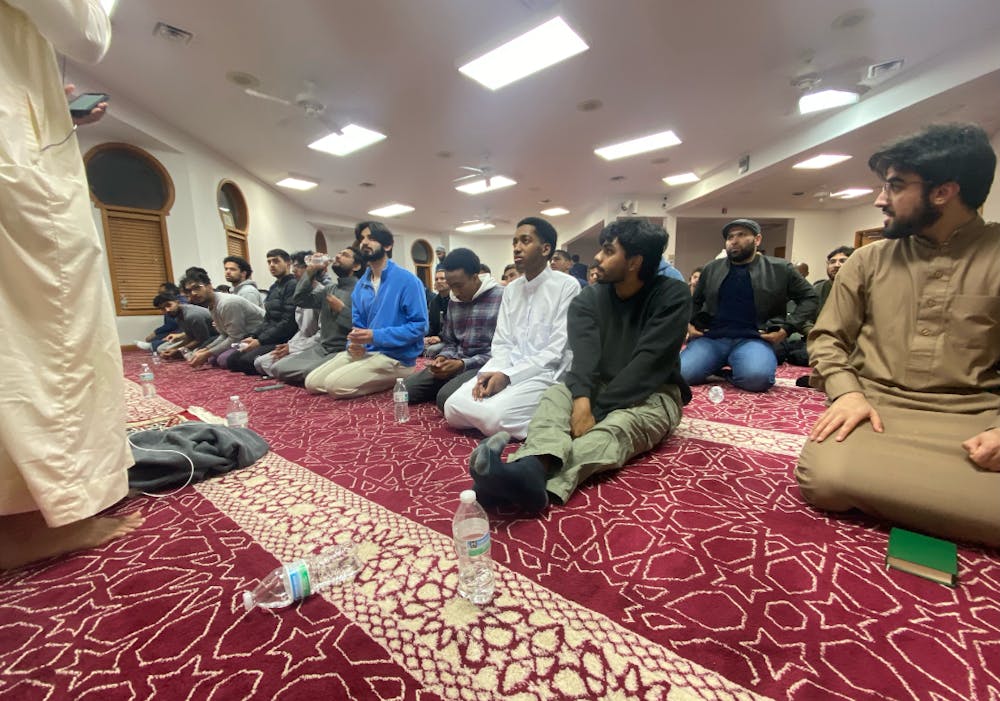Muslims around the world and in Bloomington began observing Ramadan on March 1, fasting from dawn to dusk to create self-discipline and a deeper connection to God.
Ramadan is the ninth month of the Islamic calendar, and one of the holiest, as the Quran was first revealed to the Prophet Muhammad during Ramadan. Since the Islamic calendar is a lunar calendar, Ramadan shifts every year, falling from March 1-29 this year.
The Quran outlines the rules for fasting through Surah Al-Baqarah. The surah states all those capable must abstain from eating, drinking and committing reprehensible deeds from sunrise to sunset during the entire month, to focus on bettering oneself mentally, physically and spiritually.
Asma Afsaruddin, IU professor of Middle Eastern languages and cultures, said the significance of Ramadan is to create a commitment to God, mainly through fasting.
“Abstaining from food and drink during the day and going hungry creates empathy for the poor who go hungry not out of choice but out of necessity,” she said. “The practice of fasting inculcates self-discipline and compassion in the individual for those less fortunate and reminds humans to be grateful for the bounties they receive from God.”
According to UNESCO, iftar is the meal eaten after sunset that marks the end of the day’s fast. It usually involves gatherings for individual families or entire communities, such as in Bloomington.
Mohamed Khaled Sayed, imam of the Islamic Center of Bloomington, said Ramadan in Bloomington strengthens community bonds.
Sayed said the ICOB hosts daily iftars, with a different family, cultural community or caterer each preparing various foods for the meal. The iftars feature specific cuisines like “African Night” or “Pakistani Night,” with Muslims from the greater Bloomington area attending.
“We usually have 300 people attending those iftars and we have other prayers and worships all throughout the night,” Sayed said.
Sayed said Ramadan is a time dedicated to family, which can be difficult for many college students who are away from their families — students like Ahmed Al Baharna.
Al Baharna, president of the IU Muslim Student Association, said celebrating Ramadan is very different in Bloomington versus his home country Bahrain, which is a Muslim-majority nation.
“I'd have my iftar at home with my family, which is not something that I have the option here, and most students will not have the option here,” Baharna said. “So instead of facing their family for iftar, they would face people of other backgrounds.”
Al Baharna said the IU MSA also has iftar dinners planned on campus that are student-focused, catered by IUSG and the Union Board, separate from the ones hosted by the ICOB.
Sayed said Ramadan in Bloomington is unique because of the diversity of Muslims who live here, as well as students from IU.
“You will find food from all over the world, people dressing in different ways, yet we eat all together and we pray together,” he said. “So, we focus on the unified part, which is the religion that unifies all those cultures.”
Both Sayed and Al Baharna encouraged non-Muslims to attend iftars to learn more about Ramadan and Islam.
“They can visit the ICOB, and they can also come and have a dinner with people here and start conversations,” Sayed said. “And people are always happy to receive guests and talk to them and explain to them what Ramadan means for them and what to know.”
Sayed also said the ICOB has a specific event planned March 8 at Union Street Center Auditorium for community representatives and religious leaders from IU, Bloomington and Indianapolis to learn more about Ramadan and Islam.
A 2019 survey from the Pew Research Center found that 52% of American respondents of all major U.S. religions said they knew not much, or nothing at all, about Islam. Sayed said parts of Islam and Ramadan are unknown to some Americans, and he hopes that anyone at IU or in Bloomington feels comfortable asking questions.
“I give a brief intro about Islam and then encourage them to ask any question, even if they think it's going to be offensive or anything, there are no red lines, any questions are welcome,” Sayed said.
Al Baharna also encouraged IU students to ask questions and approach Muslims on campus.
“As Muslims, we not only are happy, but we encourage people to ask questions when they have questions,” Al Baharna said. “We are very happy to answer questions. We like when people are interested, because it makes us feel interesting and that makes us feel at home at IU.”
More information about future IU MSA events can be found on its Instagram.




